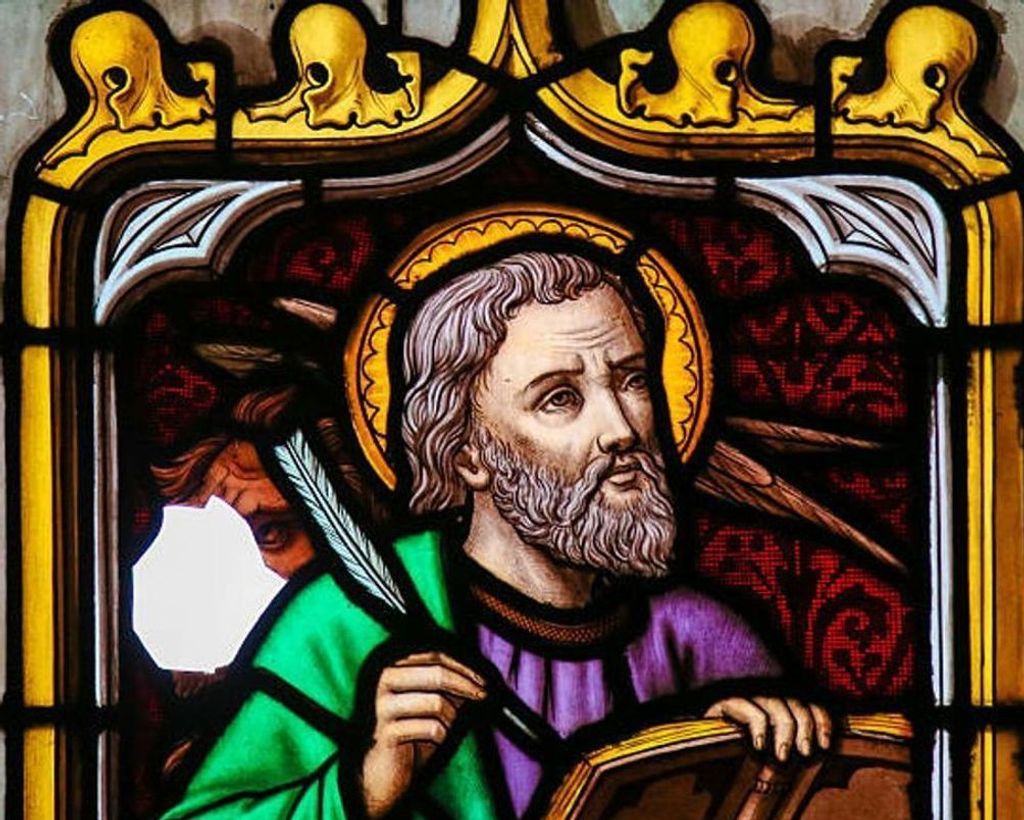
St. Mark: His Life, His Legacy, and What It Means for Us
Introduction:
We are all aware that Canon Ifill believes education is an important part of expanding our understanding of our faith, and making our worship and lives as Christians more meaningful. So, this morning we are going to spend a few minutes reflecting on St. Mark (also known as John Mark) whose Feast Day we celebrate on April 25. This date marks the date of his death. We will study him, not just as a historical figure, but as the namesake of our church.
What does it mean to attend St. Mark’s Episcopal Church? What can we learn from him that applies to us, right here and right now? Mark was not one of the twelve Apostles, but he played a vital role in spreading the Gospel and shaping the New Testament Church. His life and ministry offer rich insights into faith, courage and the power of storytelling in the Christian tradition. Mark was especially close to Peter. In fact, he became Peter’s interpreter and wrote down his teachings which is the basis for the Gospel of Mark. Mark is considered the first Bishop of Alexandria and was a key figure in establishing Christianity in Africa. He is believed to have been martyred in Alexandria around 68 BC.
1. Mark the Gospel Writer – A Witness to Christ Mark gave us one of the earliest Gospel accounts—short, fast-paced, and full of action. He wasn’t one of the original twelve apostles, but he listened closely to Peter, who called Mark his “son” in faith (1 Peter 5:13). He absorbed the stories of Jesus and turned them into something lasting. “The beginning of the good news of Jesus Christ, the Son of God.” – Mark 1:1 That’s how his Gospel opens—no long genealogy, no backstory. Just straight to the heart of it. Mark cared about the message getting out. How can we follow him? By being witnesses in our own way—sharing the good news of Jesus not just with our words but with our actions. We do not have to write a Gospel, but we do write a story with our lives.
2. Mark the Missionary – Courage in Discomfort Mark also joined Paul and Barnabas on their missionary journeys In Acts 12:25, we learn that Barnabas and Paul bring Mark with them as they return to Jerusalem. This is where the focus shifts from Peter in Jerusalem to Paul’s missionary journeys. Acts 13:5 tells us Mark went as their assistant to Salamis where they preached the word of God in the Jewish synagogues, but there was a moment of tension. He left early, and Paul wasn’t happy about it In Acts 15:37–39 we learn that Paul did not want to take Mark with them . But it wasn’t the end of Mark’s story. Barnabas took Mark and sailed for Cypres. Later, Paul asked for Mark again, calling him “helpful to me in my ministry” (2 Timothy 4:11). Mark may have stumbled, but he came back stronger. How can we follow him? By understanding that faith isn’t about being perfect—it’s about being persistent. If we’ve had moments of doubt or fear, we’re in good company. Like Mark, we’re called to return and keep showing up.
3. Mark the Church Builder – A Legacy of Community Tradition holds that Mark founded the Church in Alexandria, Egypt—one of the great Christian centers in the early centuries. That church endured persecution, division, and political upheaval, yet it remained. “So then you are no longer strangers and aliens, but... members of the household of God.” – Ephesians 2:19 How can we follow him? By being builders of community. At St. Mark’s, that could mean volunteering, reaching out to someone who’s hurting, or simply showing up to worship and fellowship. Every small act helps shape the legacy of this place.
4. Mark’s Symbol – The Lion of Courage Mark’s traditional symbol is the lion—bold, loud, and fearless. That’s not a random choice. Mark’s Gospel begins with the voice of John the Baptist in the wilderness: “Prepare the way of the Lord” (Mark 1:3). A lion’s roar announces something powerful. How can we follow him? By speaking out—with courage and love. As a church named for St. Mark, we’re called to have a voice in our community. To speak truth, to offer hope, to prepare hearts for the Lord.
In Conclusion:
We will go over how can we Carry on St. Mark’s Legacy.
1. St. Mark as a Gospel Writer – A Witness to Christ Mark gave the world one of its earliest and most action-filled Gospel accounts. He wasn’t one of the Twelve Apostles, but he listened, learned, and shared the good news. How can we follow him? By being faithful witnesses in our daily lives—sharing Christ’s message through how we live, speak, and serve.
2. St. Mark as a Missionary – Courage in Discomfort Mark journeyed with Paul and Barnabas and later worked closely with Peter. Mission work wasn't easy—he faced disagreements (like with Paul) and hardships. Yet he kept showing up. How can we follow him? By stepping out in faith even when it’s hard. Members of a church named for St. Mark should be willing to serve, even in the messy and imperfect moments.
3. St. Mark as the Founder of the Church in Alexandria – A Builder of Community Tradition says Mark founded the church in Alexandria, one of the early Christian centers. His legacy there isn’t just about preaching—it’s about building a faith community that endured. How can we follow him? By nurturing the spiritual life of this church community—encouraging one another, welcoming newcomers, and staying rooted in love.
4. St. Mark’s Symbol – The Lion of Courage and Action Mark is symbolized by a lion, often associated with courage and the powerful voice of the wilderness—“Prepare the way of the Lord.” How can we follow him? With courage. Speak the truth. Stand for justice. Don’t let fear keep you silent when God’s message needs a voice.
In conclusion, A Call to our Church Family "As members of St. Mark’s, we carry his name—let us also carry his spirit. Let us be storytellers of the Gospel, courageous missionaries in our community, and faithful builders of Christ’s Church. Like St. Mark, we may not always get it right, but if we keep coming back to the mission, God will use us in powerful ways."
RISE

The Purpose of RISE is to interrupt the effects of the school to prison pipeline. The School-to-Prison-Pipeline is fueled by zero-tolerance disciplinary policies adopted in schools across the United States which criminalize children from an early age. RISE provides a positive environment to give young people an opportunity to learn more about themselves, recognize their gifts and realize their potential to success.
The RISE program also helps young adults avoid incarceration for minor infractions through experiencing interactions with caring adults who serve as mentors. The program requires at least 60 hours of community service at St. Mark’s Episcopal Church.
For more information please contact:
Rev. Canon Angela S. Ifill
Email: angelaifill854@gmail.com
Dr. Lynette Ralph
Email: ralph.lynette@gmail.com
Phone: 404-317-5643
SPANISH CLASSES
Classes are typically held on Saturdays for an hour or more. According to the needs of the learner. They are held at the Parish Hall of St. Mark's Episcopal Church in Haines. Other interactive sessions will be held on site when the is most conducive to the learning environment.
Learners will learn the Spanish alphabet and discover which steps they should take when starting out so they can speak in sentences as quickly as possible. Then we will work with them to learn vocabulary and grammar and continue learning until they can have effortless conversations in Spanish. They will also be provided with Spanish dialogues that are created to help them learn Spanish quickly.
All Learners are invited to join us in our Saturday Spanish classes! Come and have fun and delight in learning in a relaxed atmosphere!
For more information, please contact:
Dr. Michael Ralph Email:
Email: michaelralphsr@gmail.com
Phone: 863-298-3280

TESOL

TESOL English is English taught as a second or foreign language - It is the learning and use of English by speakers with different native languages, often with learners whose native language is not English. Language education for people learning English is commonly known as English for speakers of other languages (TESOL); English as a foreign language (EFL); English as a second language (ESL); English as an additional language (EAL), or English as a New Language (ENL). ENL refers to the practice of studying English in a country where it is not the dominant language. These programs, especially ESL, are usually an academic subject, course, or program designed to teach English to students who are not yet proficient in the language.
For more information please contact:
Dr. Michael Ralph
Email: michaelralphsr@gmail.com
Phone: 863-298-3280
TESOL INSTRUCTOR TRAINING
We offer TESOL Instructor training leading to certification as a TESOL Instructor. The course covers all of the fundamental components of teaching English. It includes a total of 10 units covering topics like classroom management and lesson planning. The content includes video lectures, readings, and activities that the instructor can use in the classroom.
Unit 1: Introduction to TESOL: This unit introduces students to TESOL and TEFL. Topics covered include professional teaching conduct, fundamentals of linguistics, and approaches to second language learning.
Unit 2: Classroom Management: This unit covers the core concepts of managing a classroom. Topics covered include teaching and learning styles, behavior, and strategies for establishing a healthy learning environment.
Unit 3: Assessments: Topics include classroom testing, assessing language skills, proficiency testing and teacher assessments.
Unit 4: Planning Lessons: Topics include curriculum planning, developing a lesson plan, and identifying learning objectives. This course is accredited by the TESOL International organization and leads to certification as a TESOL Instructor.
For more information, please contact:
Dr. Michael Ralph
Email: michaelralphsr@gmail.com
Phone: 863-298-3280



